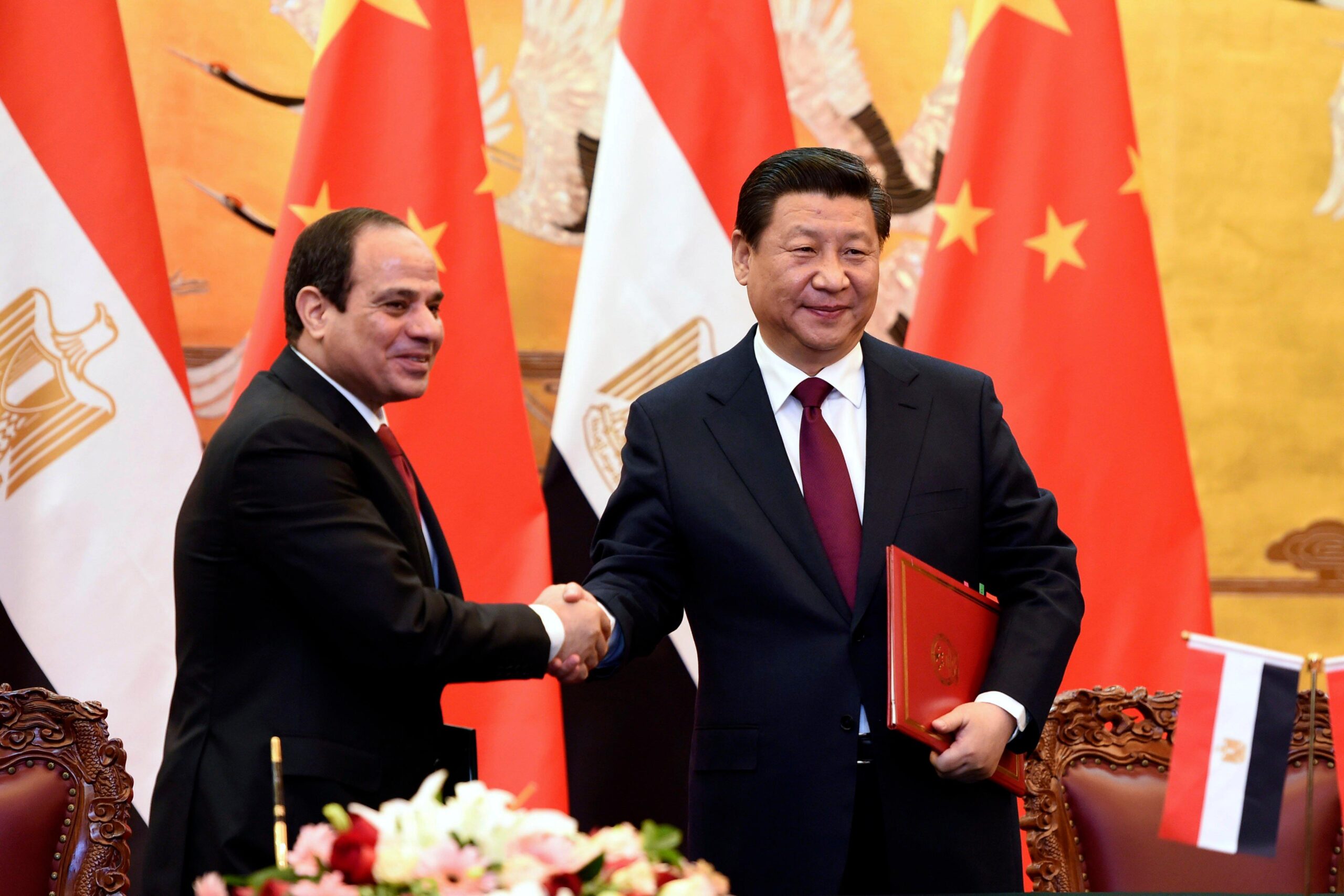On 30 June, a Chinese State Construction and Engineering Company (CSCEC) work crew lifted into place a steel skyway connecting two office buildings in the Central Business District (CBD) of Egypt’s New Administrative Capital – an engineering feat that serves as a fitting metaphor for the two countries’ rapidly developing commercial relationship.
In a 27 May press conference in Cairo marking the 65th anniversary of the establishment of bilateral relations, Chinese Ambassador Liao Liqiang noted that China has been Egypt’s main commercial partner for eight consecutive years, with the trade volume exceeding $14.5 billion and direct investments reaching $190 million in 2020.
Although Sino-Egyptian economic cooperation is not new, its scope widened after 2000, following the initiation of China’s Going Out Strategy and in the context of Egypt’s mounting socioeconomic problems. Economic ties received a strong boost with the launching of China’s Belt and Road Initiative (BRI) and Egypt Vision 2030.
The growth of economic ties between China and Egypt are informed by complementary visions for the future, underpinned by the personal authority of ambitious political leaders, driven by convergent business interests, and buttressed by compatible governing regimes.
The impetus for guiding the relationship to new heights has come from the top, with both President Abdel Fattah el-Sisi and Chairman Xi Jinping spearheading the effort. El-Sisi has made six trips to Beijing and has met seven times with his Chinese counterpart since becoming president in 2014. His initial visit, in December 2014, resulted in the elevation of bilateral ties to a comprehensive strategic partnership. Xi’s January 2016 state visit to Egypt cemented efforts to advance the bilateral relationship.
Egypt is important to China economically because of its strategic location — a critical transit point for trade flowing through the Suez Canal, of which China is the largest user. In addition, Egypt is a market of 100 million people, a major regional security provider allied with Saudi Arabia and the UAE (two valued Chinese economic partners), and emerging as a major natural gas hub in the eastern Mediterranean. Among MENA countries, it appears that China views Egypt as being especially well suited to serve as a manufacturing hub, from which to tap into African and Mediterranean markets. Chinese companies have been flocking to Egypt for that very purpose.
Since the mid-2000s, Egypt has awarded contracts across a wide range of sectors to numerous Chinese enterprises such as CITIC, Hutchison Ports, China State Shipbuilding, Power Construction Corp., Sinoma, and Sinopec. Integrated land and maritime transport and trade infrastructure lies at the heart of China-Egypt economic cooperation. Egypt was the third largest projects market in the MENA region in 2020, and CSCEC the biggest contractor in terms of contracts under execution. Project financing has been obtained with the help of loans from the Export-Import Bank of China (EximBank), the Industrial and Commercial Bank of China (ICBC), and the China Export and Credit Insurance Corporation.
The Suez Canal Economic Zone has been integrated with the BRI. Chinese companies such as China Harbour Engineering Company Ltd (CHEC), the Sino Hydro Group Ltd, and Tianjin Economic-Technological Development Area (TEDA) have played a major role in the construction of the Suez Canal Economic Zone (SCEZ). In turn, their success has attracted other enterprises to Egypt, such as China Jushi Co., Ltd., the world’s largest fiberglass manufacturer.
China and Egypt have developed a pragmatic relationship based on strict observance of non-interference in one another’s domestic political affairs coupled with state-led economic structures and agendas. Both sides appear inclined not only to demonstrate goodwill, but to turn it into good business, as illustrated by Egypt’s show of support in the early stage of the Covid-19 outbreak in China and the latter’s subsequent donation of a vaccine shipment to Egypt, which was followed by an agreement with Sinovac to locally produce their vaccine and export the surplus.
Egypt is seeking to diversify its foreign relations, not develop an exclusive partnership with China. Meanwhile, China is ramping up engagement not just with Egypt but with countries throughout the wider MENA region, including across North Africa.
As China and Egypt have grown closer, the relationship has come under more intense scrutiny, generating as many questions and uncertainties as highlights. There are signs of rising expectations that each side might be reluctant or find difficult to meet, such as Cairo’s reported outreach to Beijing to mediate the Grand Ethiopian Renaissance Dam (GERD) crisis. Given major Chinese investments in Ethiopia, as in Egypt, Beijing might be reluctant to become too deeply embroiled in the dispute, lest its engagement alienate one side or the other. The stakes for China in strategic balancing between the two countries are significant, as Ethiopia is a key partner in China’s approach to the Gulf-Horn of Africa while Egypt is the linchpin of the North Africa-Mediterranean component of the BRI. Important, too, is Beijing’s broader interest in drawing both countries out of the Western orbit.
Mounting Egyptian debt could prompt Chinese banks to decline to extend new loans, or as occurred in at least one instance, insist on payment guarantees and delay releasing them. Although Egypt’s exports to China have risen in recent years, the trade balance remains sharply skewed in China’s favor. The overall benefit of Chinese investments in mega-development projects on Egyptian job creation and private sector growth is unclear, at best. So, too, is whether the New Administrative Capital will benefit Egypt as a whole, including its poor, or primarily serve the economic interests of the military establishment and affluent Egyptians.
The New Administrative District is an apt metaphor for an extensive and rapidly developing bilateral relationship between China and Egypt, built on a foundation of economic cooperation that marries Beijing’s commercial and geopolitical ambitions with Cairo’s developmental goals and regional status and influence.
The views expressed in the Near East Policy Forum are those of the authors and do not represent the views of the Near East Policy Forum or any of its partner organisations.




